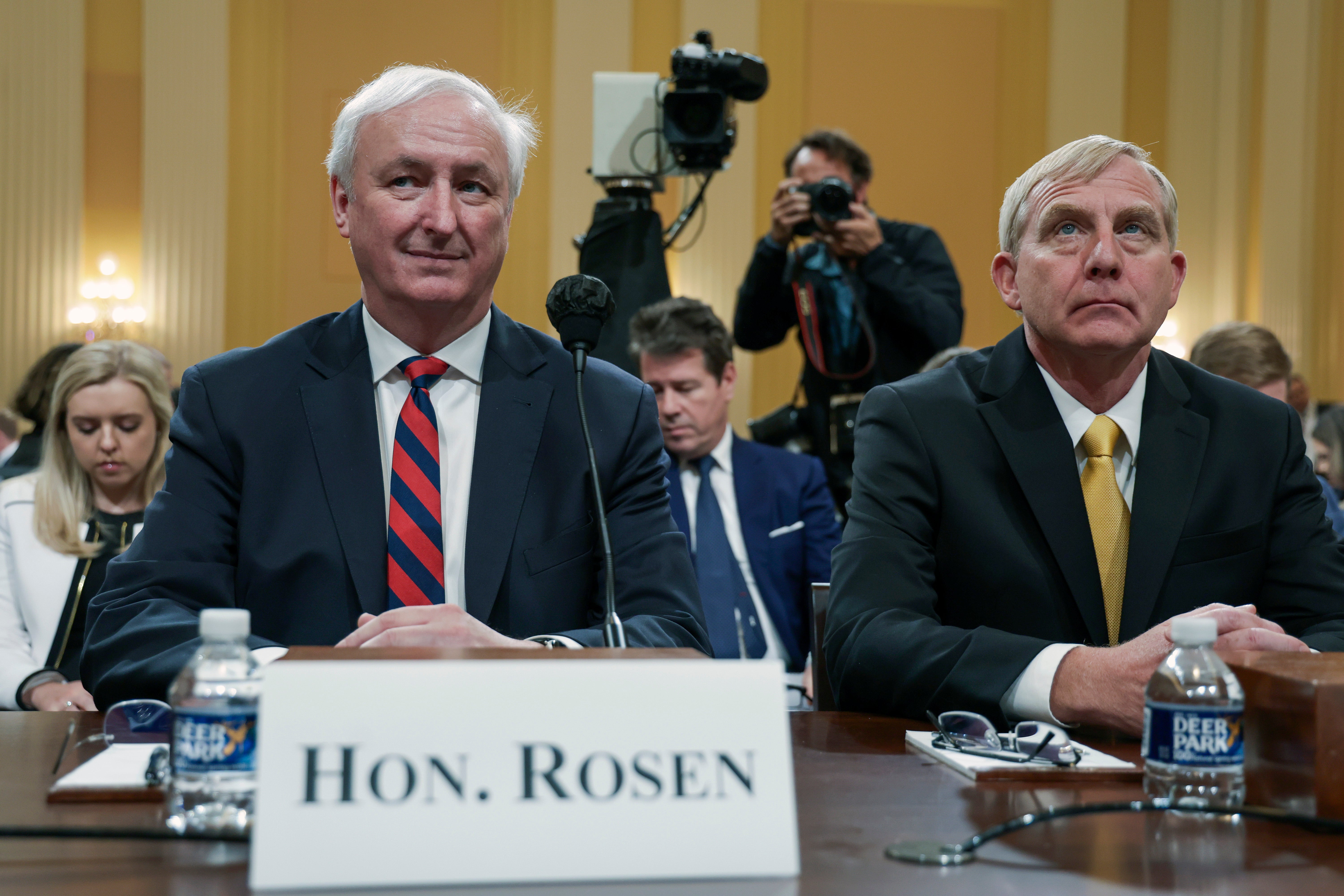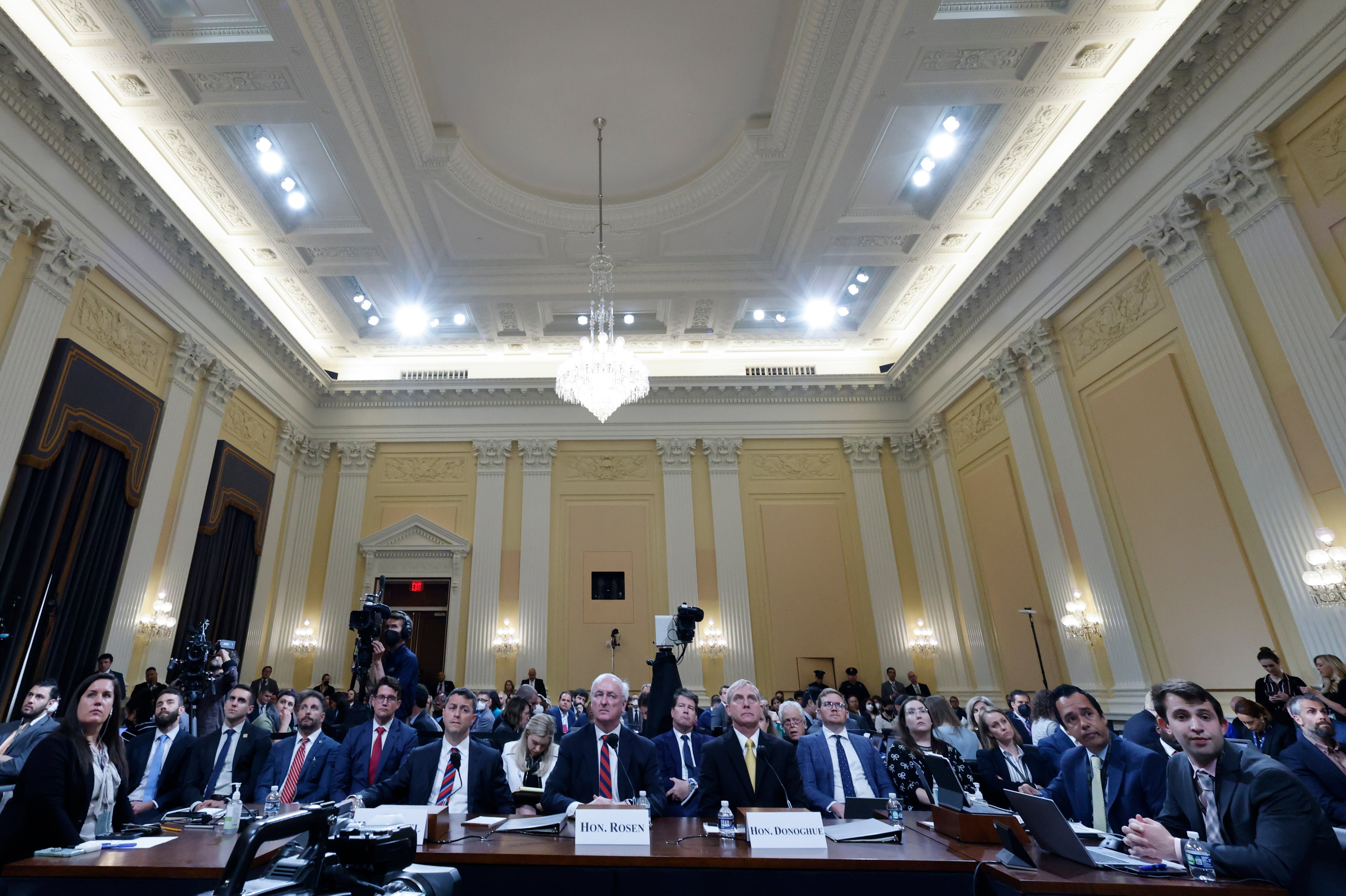Government lawyers say Trump’s plan to reverse loss in key states ‘a murder-suicide pact’
Lawyers recount alleged hounding by Trump, forcing them to threaten mass resignation

Your support helps us to tell the story
From reproductive rights to climate change to Big Tech, The Independent is on the ground when the story is developing. Whether it's investigating the financials of Elon Musk's pro-Trump PAC or producing our latest documentary, 'The A Word', which shines a light on the American women fighting for reproductive rights, we know how important it is to parse out the facts from the messaging.
At such a critical moment in US history, we need reporters on the ground. Your donation allows us to keep sending journalists to speak to both sides of the story.
The Independent is trusted by Americans across the entire political spectrum. And unlike many other quality news outlets, we choose not to lock Americans out of our reporting and analysis with paywalls. We believe quality journalism should be available to everyone, paid for by those who can afford it.
Your support makes all the difference.Donald Trump alledgedly hounded the Justice Department to pursue his electoral fraud claims, backing down only after lawyers threatened mass resignation, a congressional inquiry has heard.
The Justice Department officials from the Trump administration recounted persistent badgering from the president to help overturn his 2020 election defeat in a testimony to the House panel investigating the Capitol riots on Thursday.
Former acting deputy US attorney general, Richard Donoghue called Mr Trump’s attempt to reverse his loss in key states a part of the “murder-suicide pact”, adding that while the president presented the department with an “arsenal of allegations”, none of them were true.
Mr Trump even prodded the department at various points to seize voting machines, to appoint a special counsel to probe fraud claims and declare the election corrupt, he added in the latest hearing which mostly centred on the legal push by the former president to undo the election results.
"For the department to insert itself into the political process this way, I think would have had grave consequences for the country. It may very well have spiralled us into a constitutional crisis," Mr Donoghue said.
Jeffrey Rosen, the acting attorney general in the final days of the Trump administration, said that the president either met or called virtually every day. The common theme, he said, was "dissatisfaction that the Justice Department, in his view, had not done enough to investigate election fraud."
The testimony showed that while most Justice Department officials refused to bow down to Mr Trump’s pressure, the former president allegedly found a willing ally in Jeffrey Clark. Introduced to Mr Trump by a Republican congressman, Mr Clark, an environmental enforcement lawyer, postured himself as an eager advocate for the electoral fraud claims.

The former president even toyed with the idea of replacing Mr Rosen with Mr Clark during a tense 3 January meeting in the Oval office but backed down amid warnings of mass resignations.
At one point, Mr Clark presented colleagues with a draft letter pushing Georgia officials to convene a special legislative session on the election results. Though he wanted the letter sent, but the Justice Department superior refused.
Donoghue told the committee that White House Counsel Pat Cipollone referred to the letter Clark wanted to send to several states as “a murder-suicide pact”.
“It’s going to damage everyone who touches it,” Mr Cipollone added, according to Mr Donoghue. “And we should have nothing to do with that letter,” reported LA Times.
White House lawyer Eric Herschmann said in a deposition that he had warned Mr Clark against acting on the letter. “Congratulations. You just admitted your first act as attorney general would be committing a felony,” he said.
Deriding Mr Clark, representative Adam Kinzinger, an Illinois Republican and committee member, said his sole qualification as a lawyer was his fealty to Trump and his willingness to do whatever the president wanted, "including overthrowing a free and fair democratic election."
Mr Clark, who was not among the hearing witnesses, has not issued a comment on the matter. He had earlier appeared in private before the committee. On Thursday, the lawmakers placed a videotaped deposition before the committee, showing him repeatedly invoking his constitutional right against self-incrimination in response to the questions.
Meanwhile, hours before the hearing, the federal agent on Wednesday searched Mr Clark’s Virginia home, reported AP. It was, however, unclear what the agents were seeking.
According to the handwritten notes by Mr Donoghue highlighted during the hearing, Mr Trump directed Mr Rosen to "just say the election was corrupt and leave the rest to me and the R Congressmen."
Mr Rosen said, he declined. “We did not think they were appropriate based on the facts or the law," he told the committee.
Additional reporting from the wires
Join our commenting forum
Join thought-provoking conversations, follow other Independent readers and see their replies
Comments